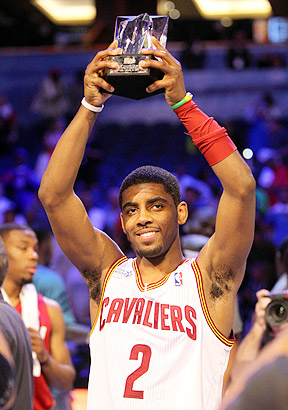
ORLANDO -- Maurice Cheeks initially seemed a bit offended by the question.
The former championship point guard for the Philadelphia 76ers, who was as tough and proud as they came in his heyday, was asked before Friday night's "Rising Stars" showcase game at Amway Arena what he thought about the new golden age of players at his old position these days.
"Golden age?" Cheeks shot back. "Point guard is obviously different than when I was playing. Point guards are able to do more things. They can score, they can rebound, they pass; they do a little bit of everything. In my golden age, we pretty much did one thing. And we had the ability to score, but our job was pretty much to set up our team. These guys' abilities go far beyond that now."
Just consider Kyrie Irving as Exhibit A. If Cheeks needed someone to embody the spirit of the message he was trying to relay, Irving stepped to the forefront. Right on cue. Irving showed style, speed, pizzazz, grit and a million-dollar smile throughout a night when he shined brightest among the league's top young stars to lead Team Chuck to a 146-133 victory in the Rising Stars Challenge showcase that featured the league's best rookies and second-year players.
The No. 1 pick in last June's draft, Irving was a can't-miss prospect who couldn't miss a thing Friday night. Irving made 12 of 13 shots, finished with 34 points, 9 assists and 2 steals to earn the game's most valuable player award -- a distinction that validates his status as the league's future at the position.
The Cleveland Cavaliers catalyst isn't too shabby in the present, either.
"You know, it's kind of unfortunate that it comes in an All-Star Game," Irving said of what he believes was the best shooting display he's ever had in a game at any level. "These stats don't carry over to the season. But at the end of the day, it was still fun to get out there with those talented guys."
Cheeks was the product of a show-me-something-first era of point guards. So it's understandable if he's not completely ready to anoint the league's current crop of young guards as a certified movement just yet. But the facts are the facts. There's a renaissance at the position in the NBA, and the future kept flashing before Cheeks' eyes every time Irving, Washington's John Wall or Minnesota's Ricky Rubio darted up the court, dunked emphatically or dished a behind-the-back, no-look assist.
Defense is only a rumor in these kind of games. But it doesn't dispute the notion that if these guys have the ball moving forward for their respective franchises, then the league certainly is in great hands. What we saw Friday night is just a snapshot of what the league has become at point guard.
Young.
Flamboyant.
Scary athletic.
Imagine if Dennis Johnson had LeBron James' leaping ability. You might have the makings ofRussell Westbrook. Or what if Isiah Thomas' speed and attacking style was meshed withRay Allen's shooting stroke. Those were the sort of hybrid flashes Irving displayed Friday night.
"They're better athletes," said Cheeks, who coached a team that included Irving and Wall. "From the smallest guy to the tallest guy, they dunk the basketball, rebound the basketball very well."
Cheeks, of course, is modestly selling his era a bit short. He shared an era in the 1980s with Hall of Famers Magic Johnson, Dennis Johnson, Thomas, John Stockton, John Lucas and many other dynamic players at the position.
But there's an undeniable youth movement that's spreading across the league now. At least 15 of the NBA's 30 teams are run by point guards with four or fewer seasons of experience. Irving, Rubio, Wall and Kemba Walker represented the newer faces in that group Friday. Derrick Rose and Westbrook, who are both in their fourth season, will headline the class in Sunday's All-Star Game.
Nestled within those units are the likes of Tyreke Evans, Stephen Curry, Brandon Jenningsand Jrue Holiday and Ty Lawson, among others. It led to some bold talk among those who claim to be ushering in a changing of the guard. There aren't many teams in the league that can say they aren't encouraged by the prospects they have at the point guard.
"This class of guys, we have a great chance to be special at the position -- and that's coming from someone [Cheeks] that was special at the position," Wall said Friday. "As long as we continue to grow, get better, watch film and keep figuring out what to do, but we still have a lot to learn, a lot to do."
Cheeks, an assistant with the Oklahoma City Thunder, has seen Westbrook's rapid development from a raw and athletic talent to a skilled and elite catalyst alongside Kevin Durant. Ron Adams, who coached Friday's losing team that included Rubio, Jeremy Lin andBrandon Knight, as an assistant in Chicago has also witnessed Rose mature in three seasons from a rookie to the league's reigning MVP.
"It's kind of an interesting time in the league," Adams said. "All of the guards on our team are very good players and have come along well this season, but there are so many good point guards in this league right now. We have one that I'm partial to, but there's just a lot of great point guards."
Irving is just proving to be the latest product in the NBA's promising and deep point guard pipeline.